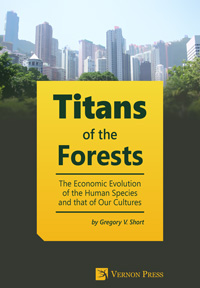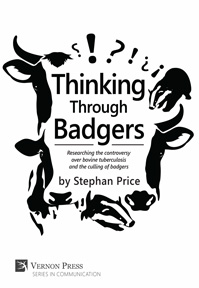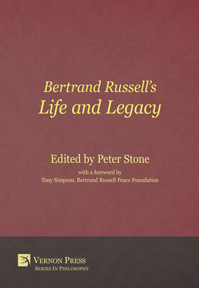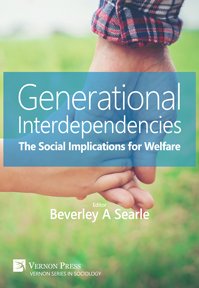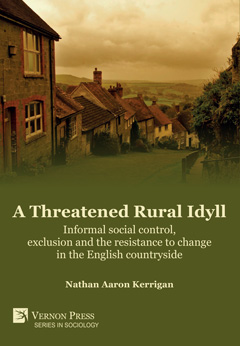Messy Ethnographies in Action
Alexandra Plows (Ed.)
by Nicola Harding , Gabriel Popham , Martyn Hudson , Joe Painter (Durham University), George Jennings , Nina Isabella Moeller , Lisa Potter , Rafi Alam , Lauren Crabb , Mary Gearey , Monika Rut , Alexandra Plows (Bangor University ), Ville Savolainen , Trudy Rudge , Luisa Toffoli , Sandra West , Andréa Bruno de Sousa , Wayne Medford , Paola Jirón , Sue Lewis
Purchase this book
(click here to change currency)
Taking John Law’s notion of ‘method assemblage’ as its basis, this edited volume describes, in honest terms, experiences of ethnographic research across a variety of disciplines and fields of study from Geography to Nursing. The result is a rare insight into the inevitably ‘messy’ processes involved: the blurring of the professional self with personal biography; the conflicts inherent in different conceptions of what is, and is not, ethical research practice; the challenges in encouraging participation; the fluidity of what we might understand as the field/site or space in which we conduct research. The book as a whole, however, is not simply an account of the ‘mess’; importantly, the chapters also explore what accounting for the mess allows us to see that would otherwise be hidden, tidied away, or cleaned up. In this sense, the volume encourages us not just to be bolder, as Plows nicely puts it, about ‘showing our workings out’, but also about allowing that mess, the ‘webby and uncertain character’ (Law, Foreword) of research to take us down different paths. As such it is a valuable resource for academics across the social sciences, and not just ethnographers who are perhaps the social scientists most at ease with mess in the first place. The book is also a vital, and reassuring, read for any PhD student struggling with why what actually happens during their fieldwork often bears no resemblance to any research design, or indeed what eventually gets written ‘up’ in a conventional social science thesis.
Dr. Shari Shabeti
The University of Edinburgh, UK
William James talked of the 'blooming buzzing confusion' of life, in the context of how a baby might experience the world. Following Law (2004), the multiple authors in this wonderful book all ruminate on how these qualities never really left ethnography, however, tidied up the final product of ethnographic research might be. Instead, they provide multiple examples of the messiness of the everyday, whether this be the multiple perspectives and meaning-making of different actors in the ethnographic endeavour, their enmeshment with the multiple realities of the human and the nonhuman, or some of the many moral, ethical and practical questions posed by ethnographers refusing to ‘tidy’ the world either analytically or through their actions in it. Embracing diversity in this way – both in their individual accounts and across the book as a whole – is essentially a political act, and the contributors do not shy away from making these connections manifest. As case studies in ethnographic meaning-making and reportage, these accessible chapters will not only be a worthwhile teaching aid – both for their individual topics and the approaches to messiness to which they speak – but will be relevant and engaging to all students of the contemporary. They are pieces that can either be skimmed through (and the abstract and keywords for each chapter, and final index, help the reader in this task no end) or their wisdom savoured slowly, like a messy cream cake! It makes one wonder what, if anything, a ‘clean’ ethnography might look like - my guess is it would certainly not be as uniquely absorbing as the collection assembled here.
Prof. Dr. Andrew Russell
Department of Anthropology, Durham University, UK
This edited collection takes its starting point from John Law’s (2004) work After Method: Mess in Social Science Research. The aim is to clearly demonstrate the ways that messiness is an active and crucial part of the ethnographic research process, whether during data collection, negotiating ethical clearance or in the process of writing up and reflecting on research journeys. Mess, it is argued, is an ever-present and often overlooked actor in constructing ethnographic realities. Spanning an impressive array of fieldsite locations and important questions (from the Amazonian jungle to participatory action research with women offenders, to questions about who the research is for and how to best represent that ethically and politically), this volume takes ideas around mess seriously and tries to unpack these through a range of ethnographic encounters. The book’s key strength lies in the rich descriptive ethnographic data presented and the largely accessible and engaging writing style of its authors.
Overall, this volume tackles the issue of mess and its connection to ethnography concisely, whilst also reaffirming the importance of ethnography to capture diverse social realities and worlds.
Prof. Dr. Miriam Snellgrove
School of Sociology, Politics and International Studies, University of Bristol, UK
This edited collection of chapters showcases original and interdisciplinary ethnographic fieldwork in a range of international settings; including studies of underground pub life in North East England; Finnish hotels; and bio-scientific institutions in the Amazonian rainforest. Informed by John Law’s concept of ethnographic “mess,” this book makes a unique, empirically-informed, contribution to an understanding of the social construction of knowledge and the role that ethnography can and does play (Law, 2004). It provides a range of colourful snapshots from the field, showing how different researchers from multiple research environments and disciplines are negotiating the practicalities, and epistemological and ethical implications, of “messy” ethnographic practice as a means of researching “messy” social realities.
Law notes that “social…science investigations interfere with the world…things change as a result. The issue, then, is not to seek disengagement but rather with how to engage” (ibid p14). Drawing on their own situated experiences, the book’s contributors address the “messy” implications of this and also explore the (equally messy) issue of why engage. They reflect on the process of undertaking research, and their role in the research process as they negotiate their own position in the field. What is ethnography “for”? What impact should, or do, we have in the field and after we leave the research site? What about unintended consequences? When (if ever) are we “off duty?” What does “informed consent” mean in a constantly shifting, dynamic ethnographic context? Is ethnography by its very nature a form of “action research?” By providing a wide range of situated explorations of “messy ethnographies,” the book presents a unique, hands-on guide to the challenges of negotiating ethnography in practice, which will be of use to all researchers and practitioners who use ethnography as a method.
Foreword: The Politics of Ethnography
John Law
Introduction: Coming Clean About Messy Ethnography
Alexandra Plows
Section 1 Reflecting on Messy Research Practice
Chapter 1 Mud on the carpet: messy reflexive practices with older environmental activists- bringing the outside in
Mary Gearey
Chapter 2 Revealing a ‘Hidden Civil War’: a serendipitous methodology
Sue Lewis, Martyn Hudson, and Joe Painter
Chapter 3 Changing forms of ethnography and shifting researcher positioning in the study of a Mexican martial art
George Jennings
Chapter 4 Haphazard knowledge production: thoughts on ethnography and mess in the urbanising Ecuadorian Amazon
Nina Isabella Moeller
Section 2 Messy Ethics
Chapter 5 The case for more ethnographic research with the criminal’s perspective
Lisa Potter
Chapter 6 Managing morality: neoliberal ethics regimes and messy field work
Rafi Alam
Chapter 7 Everyday messiness of ethnography: reflections on fieldwork in Mid-West Brazil
Lauren Crabb
Section 3 Messy Participation
Chapter 8 The boundlessness of digital democracy – ethnography of an ICT-mediated public in Brexit Britain
Gabriel Popham
Chapter 9 Places on probation: an auto-ethnography of co-produced research with women with criminal biographies
Nicola Harding
Chapter 10 ‘Messily embedded’: an auto- ethnography of redundancy in the Welsh nuclear industry
Alexandra Plows
Chapter 11 A messy ethnography of mess
Ville Savolainen
Section 4 Messy Research Sites and Spaces
Chapter 12 Not only the night: the messiness of ethnography of nurses’ night work
Trudy Rudge, Luisa Toffoli and Sandra West
Chapter 13 Adapting to parents in crisis: tracing experiences of having a child with chronic kidney disease
Andréa Bruno de Sousa
Chapter 14 Attempting to deep map multiple realities: the “therapeutic landscape” of Saltwell Park
Wayne Medford
Chapter 15 The challenges of ethnographic practice in current urban complex situations
Paola Jirón and Walter Imilan
Chapter 16 Sharing foodscapes: shaping urban foodscapes through messy processes of food sharing
Monika Rut and Anna R. Davies
Author Biographies
Index
Dr. Alexandra Plows is a Research Fellow at Bangor University and has over 20 years of experience as an ethnographer. Her Ph.D. and early research work focused on the UK environmental direct-action movement from an “insider” perspective and was informed by feminist research practices, particularly autobiographical and reflexive approaches. She then spent several years undertaking qualitative research, including ethnography, exploring emergent public engagement with human genetic technologies. Through this research, she made an empirical contribution to Science and Technology Studies (STS) literature on public knowledge and public engagement, and STS debates on (scientific) knowledge as a social construct. Dr. Plows has also undertaken ethnographic research relating to the dynamics of regional labour markets, specifically an “embedded” ethnography of stakeholder organisations seeking to mitigate the impacts of deindustrialisation and redundancy in North Wales.
Dr. Plows’ research approach can be summarised as reflexive and participatory ‘action research’ informed by environmental and social justice frameworks. Many of her current research projects are focused on interdisciplinary, participatory research and knowledge exchange, particularly at the interface of social science and environmental studies, such as human/nature relationships, and associated practices and values.
mess; ethnography; reflexivity; autobiography; autoethnography; action research; knowledge construction; ethics; activism; anthropology; sociology; criminology; human geography; science and technology studies; health and medicine; community studies; sustainable development; human/nature relationships; social movements; workplace; employment
See also
Bibliographic Information
Book Title
Messy Ethnographies in Action
ISBN
978-1-62273-329-3
Edition
1st
Number of pages
216
Physical size
236mm x 160mm

![Messy Ethnographies in Action [Hardback]](/file/5831/2fed7fbfe41d0f351cc5b9ee6bd35e8d/1526366193.jpg)


